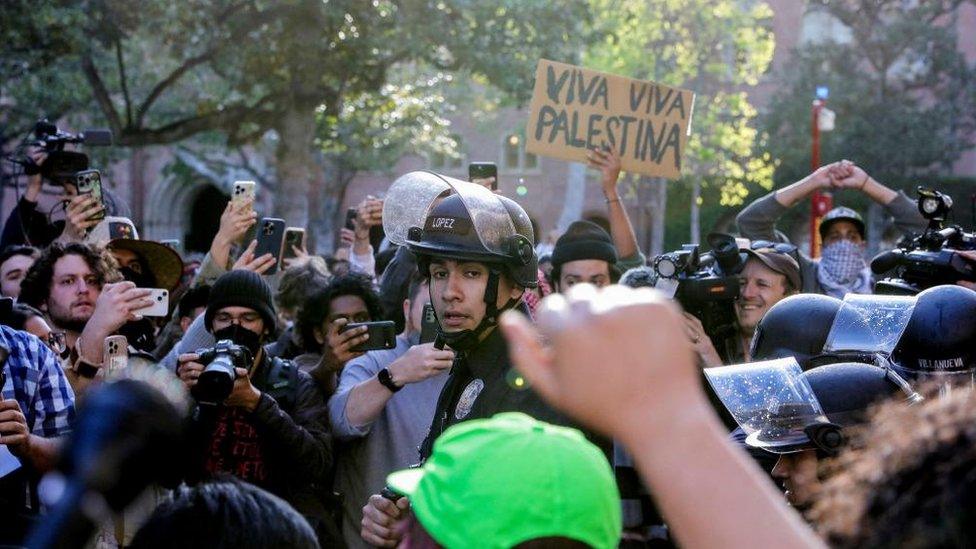What do pro-Palestinian student protesters at US universities want?
- Published
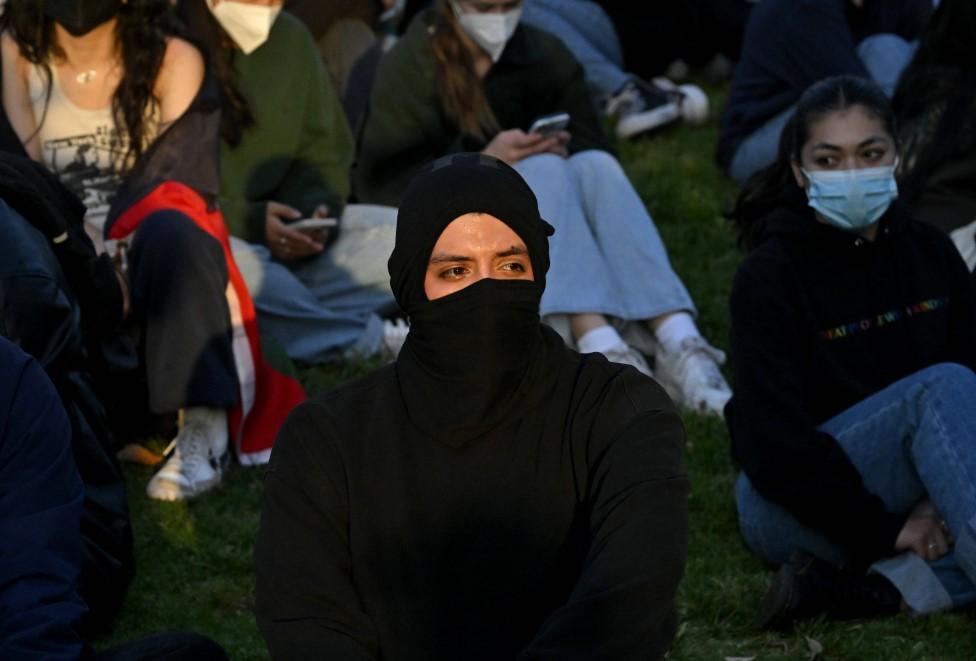
Thousands of students, at more than 130 colleges and universities across the US, have demonstrated in opposition to the ongoing war in Gaza with protests and encampments.
More than 2,000 demonstrators have been arrested, but the protests continue as universities prepare for graduation ceremonies in coming days.
Why are students protesting over the war in Gaza?
Since the 7 October attack by Hamas and Israel's retaliatory assault, students have launched rallies, sit-ins, fasts and, most recently, encampments against the war.
They are demanding that their schools, many with massive endowments, financially divest from Israel.
Divestment, for many of the protesters, means cutting those endowments' ties to Israeli companies or ones that do business with Israel. Many also want their universities to end academic relationships with Israeli institutions.
Student activists say that companies doing business in Israel, or with Israeli organisations, are complicit in its ongoing war in Gaza - as are colleges investing in those companies.
University endowments fund everything from research labs to scholarship funds, mostly using returns from millions - and billions - of dollars in investments.
Why did these protests start?
The encampments began last month, with dozens of students at Columbia University pitching tents on a campus lawn while the president of the New York City university testified before Congress about antisemitism.
The police moved in a day later and detained the protesters, sparking a wave of action at other colleges across the US.
Activists quickly set up camp again at Columbia and eventually moved into an academic building.
The police were called in again due to vandalism and risks to public safety, the university said.
More than 100 arrests were made as both the building and encampment were cleared.
Watch: See how Gaza campus protests spread across the US
Where else are students protesting?
The escalating crisis at Columbia inspired similar protests and encampments across the country, including:
Northeast region: George Washington; Brown; Yale; Harvard; Emerson; NYU; Georgetown; American; University of Maryland; Johns Hopkins; Tufts; Cornell; University of Pennsylvania; Princeton; Temple; Northeastern; MIT; The New School; University of Rochester; University of Pittsburgh
West Coast: California State Polytechnic, Humboldt; University of Southern California; University of California, Los Angeles; University of California, Berkeley; University of Washington; Oregon State University
Midwest region: University of Wisconsin; Northwestern; Washington University in St Louis; Indiana University; University of Michigan; Ohio State; University of Minnesota; Miami University; University of Ohio; Columbia College Chicago; University of Chicago
The South: Tulane; Emory; Vanderbilt; University of North Carolina, Charlotte; University of North Carolina, Chapel Hill; Kennesaw State; Florida State; Virginia Tech; University of Georgia, Athens
Southwest: University of Texas at Austin; University of Texas, Dallas; Rice; Arizona State
The BBC has counted more than 130 colleges and universities in the US where protests or encampments have arisen in the past few weeks. Protests have occurred in 45 states and Washington D.C.
Pro-Palestinian protesters have also gathered over the past week on university campuses in Australia, Canada, France, Italy and the UK.
How have universities handled the protests?
Some are negotiating with student activists while others are issuing ultimatums that have led to police being called in.
An agreement was reached between Northwestern University near Chicago and protesters that limits the size of the encampment.
Another deal was reached at Brown University where school officials agreed to hold a vote on divestment in October in exchange for students removing the encampment.
National politicians have called on colleges to do more, highlighting antisemitic incidents at some protests.
Jewish students at several campuses have told the BBC about incidents that made them feel uncomfortable or fearful.
These ranged from chants and signs supporting Hamas, a proscribed terror group, to physical altercations and perceived threats.
How many people have been arrested?
More than 2,000 people have been arrested at the demonstrations across the US, according to a tally compiled by the Associated Press.
In just the first two days of May alone, hundreds of arrests were made at campuses around the country, including Yale, Dartmouth, Stony Brook, Portland State, the University of Wisconsin and the University of Texas at Dallas.
At UCLA, 210 people were taken into custody after police moved in on a pro-Palestinian encampment.
In New York, 282 were arrested earlier this week after police cleared Columbia's Hamilton Hall - which had been occupied by protesters - as well as the encampment on campus. The figure includes detentions made at the nearby City College of New York.
Has protesting worked?
Pro-Palestinian campus groups have for years called on their institutions to support the Boycott, Divestment and Sanctions (BDS) movement, as a means of pushing back against Israel.
No US university has ever committed to the BDS framework, although some have cut specific financial ties in the past.
While divestment would have a negligible impact, if any, on the war in Gaza, protesters say it would shed light on those who profit from war and help build awareness of their issue.
In response, Israel has banned some BDS groups from entering the country.
Why are students recalling protests over Vietnam War?
Activists at Columbia and elsewhere have highlighted the protests at the end of the 1960s against US involvement in the Vietnam War.
Thousands were arrested and there were violent clashes with police.
Four students in Ohio were killed in 1970 when the National Guard opened fire. The National Guard is not being deployed to the Gaza campus protests.
Their deaths triggered a nationwide student strike and hundreds of universities closed.
Could commencement be affected?
Graduation ceremonies across the US are kicking off this weekend and some protests are expected including at Indiana University and the University of Michigan. It remains to be seen exactly what demonstrations at commencements will look like.
At the University of Southern California, the commencement ceremony was cancelled altogether because of the potential impact of protests. On Friday, the school announced it would host an event celebrating graduating students at the LA Memorial Coliseum.
Related topics
- Published28 April 2024
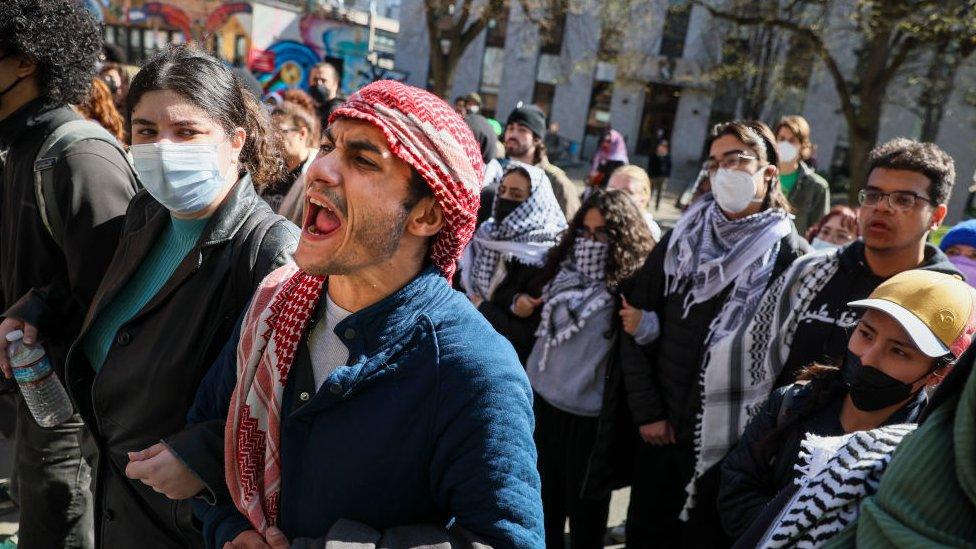
- Published27 April 2024
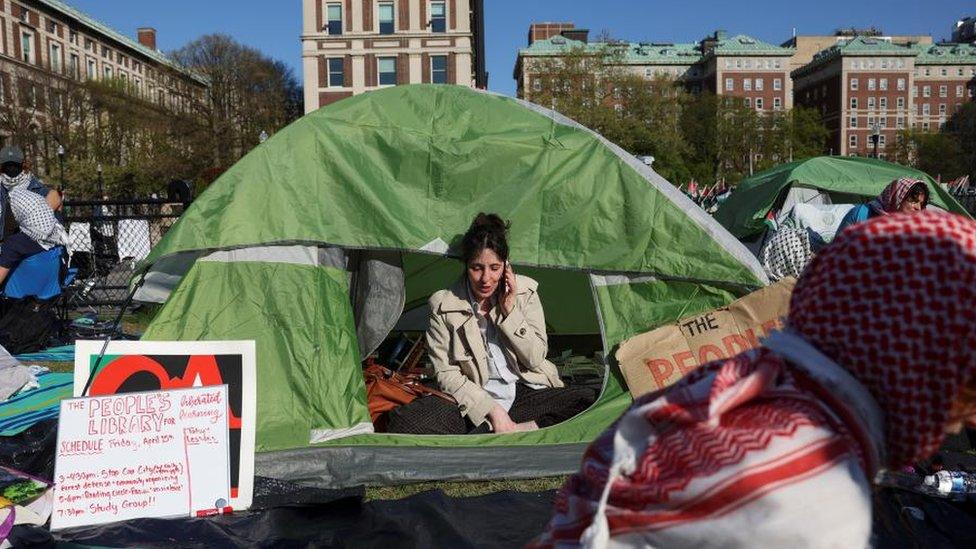
- Published29 April 2024
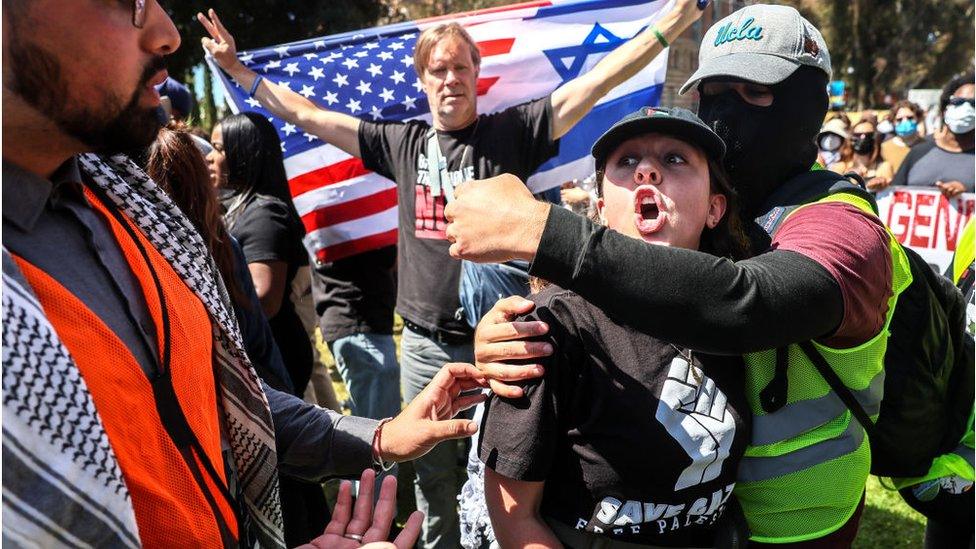
- Published26 April 2024
